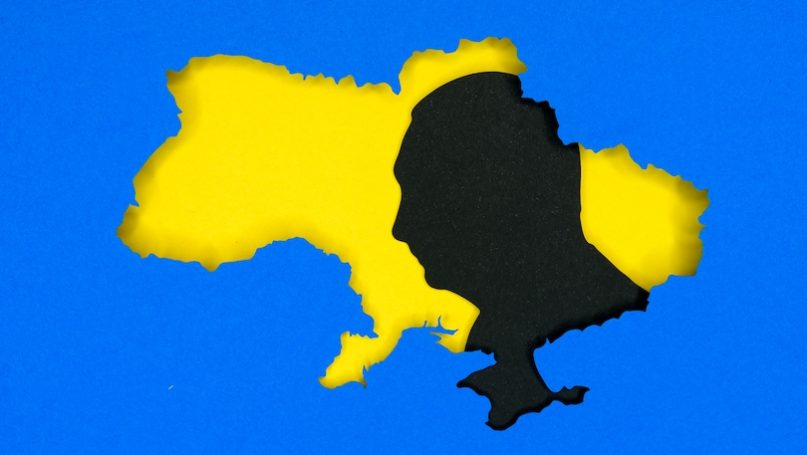
There is a great wish to know what drives Russian President Vladimir Putin to wage war against Ukraine. In Putin’s own perspective, which he elaborated for nearly one hour in an official statement last Monday (21 February 2022), his war has precedents in Western actions such as the bombing of Belgrade during the Kosovo War in 1999. Putin does not seem to realize, or does not want to acknowledge, that a massive invasion by land of a sovereign state is unprecedented in European history since 1945. For Putin, a logical chain links Western behaviour, the enlargements of NATO; interventions in Kosovo, Libya, and Syria, to the action he has now chosen, the invasion of Ukraine. He only responds, or so he claims. He is not driving action, but driven to act in order to defend essential security interests of his state and nation. Literally, he perceives a “knife against our throat”.
It is easy to dismiss Putin’s statements as mere propaganda trick – as an ideology that has no basis in the facts and therefore serves the sole purpose of manipulating his followers and world opinion. Indeed, the links Putin establishes seem partly quite crude and artificial. For him, it all may make sense; but isn’t it quite misguided to justify a war by reference to decisions of Russian revolutionaries in the early 1920s? Before talking about Western actions, Putin indeed spoke for nearly half an hour about the historical ties between Russia and Ukraine and the terrible mistake Soviet leaders had made when they established federalism as an official principle of their Union, a principle that, as Putin explained, was never practiced but came to importance at the end of the 1980s, when (in his view) “a great geopolitical disaster” of the 20th century brought the end of the state he had served as an agent. Two narratives hence justify his decision to invade Ukraine: a felt encroachment by the West and NATO on the one hand, and a specific view of history according to which Ukraine’s possession by Russia is historically justified, on the other.
Which of the two narratives is more important? In his 21 February statement, Putin spent about the exact same time on each, speaking at first about half an hour on the history of Russia’s role in Ukraine and then another 30 minutes about NATO actions and Western hypocrisy. It is as though he wanted to say they matter both equally. Yet the question which one matters more has crucial implications for our understanding of the situation we find ourselves. If Putin wants to iron out historical decisions made 100 years ago, the Western response has hardly a chance to convince him to change course. If, however, he is indeed motivated by the feeling of being threatened and disrespected by the West, then the way Western decision-makers behave and talk can have a greater influence on his action. The Western response can then either reassure him and bring back some stability; or it can make things worse with even more unforeseeable, possibly unprecedented effects. In this case, tough sanctions, which risk being perceived as a form of punishment, may very well have counterproductive effects.
At the end of his statement, Putin looked seriously into the camera and declared that he would now say something he never had said in public before. He said that, in 2000, when he had just become President, he met US President Bill Clinton – who was just about to leave office. Putin claimed he suggested to Clinton the option of Russia joining NATO, but Clinton rejected it right away. Putin then added: they don’t have a place for us in their world, they are afraid of who we are, a big country which they don’t know how to integrate. Again, Putin’s admission, made 22 years after the fact, of his testing out of the chance to be within rather than be without, may be motivated by many different things. It may just be made to reinforce the feelings of exclusion and dismissal among his supporters. Yet it may also express some of Putin’s own true feelings. In the latter case, a lot may depend on how we talk to him and treat him.
Putin’s view of the world may be idiosyncratic, but it is unfortunately not uncommon today. It corresponds to the worldview of Donald Trump, who immediately after the invasion commended Putin as a “genius”, and of many who have today turned to believe in conspiracy ideologies about hypocritical enemies who never say the truth. These believers, driven by hurt feelings and a corresponding desire for revision and revenge, include Hungarian and Polish right-wing politicians, Brexiteers and Brazilian nationalists, climate sceptics and corona sceptics. The deeper phenomenon from which the Ukrainian war results has a truly global, international character. It is a deterioration of the political climate that turns at first words, and then deeds violent. It is a highly disconcerting development that makes its observers feel helpless and without any power to change the course of those who run amok.
There are two things we can be sure of. First, the phenomenon is no one-way street: what can move into the direction of ever more violence can also move backwards. Second, while there can be no certainty about our influence, the only chance we have is to bet on the possibility that our words and our actions – wisely chosen not only to make limits clear, but also provide security and recognition – will make a difference.
Further Reading on E-International Relations
- Opinion – The West’s Mental Lockdown over Putin’s Invasion of Ukraine
- Opinion – A Psychological Perspective on Putin’s War with Ukraine
- Opinion – The Risk of Nuclear War with Russia
- Opinion – On 9 May Putin’s Russia Will Glorify War and Stalin
- Vladimir Putin’s Imperialism and Military Goals Against Ukraine
- Opinion – The Russian Invasion of Ukraine: Between Solidarity and Whataboutism